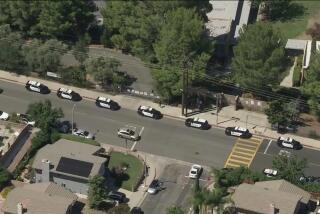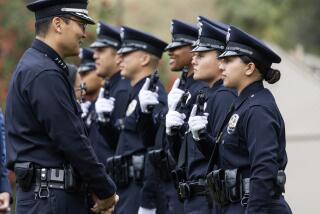Op-Ed: Educators, not cops, should handle discipline in class
The 16-year-old was texting in math class. Her teacher told her to leave the room. She refused to comply with the order even after a vice principal arrived. That’s when the violence began.
Millions of Americans have now seen the viral video of a white South Carolina sheriff’s deputy forcing a black student from her desk and slamming her body to the ground. The deputy quickly brought an end to her disruptive behavior, and to his career. He has rightly been fired for his methods.
Students learn from the curriculum. They also learn from the behavior of the adults in their classrooms. What were they taught that day? Rather than being shown that time and patience can bring tense events to a peaceful end, that it is wrong to initiate force against another person or that violence is a last resort legitimately used only when all other options are exhausted, these impressionable students were taught that a body slam is an appropriate response to a recalcitrant teenager who poses no physical threat.
If we keep outsourcing disciplinary problems to cops, we’re as culpable as they are for their excesses.
Debate about the video has focused on whether the sheriff’s deputy, Ben Fields, used excessive force. That seems obvious. But it makes as much sense to question whether any force was justified in that situation — and, by extension, whether educators erred by involving law enforcement.
Fields was assigned full time to the school, which may be the root of the problem.
An estimated 14,000 school resource officers are assigned to schools across the country. Many answer to police brass rather than educators. The Los Angeles Unified School District runs its own police force, giving educators more influence. But its 350 sworn police officers still belong to a profession unaccustomed to turning conflicts into teachable moments. They are trained, equipped and socially conditioned to force compliance.
That can be indispensable in an emergency but dangerous in situations where no observer would think, “Yikes, I better call 911.”
As Janel George of the NAACP said in an interview with this newspaper, “What we find is school safety becomes conflated with school discipline — officers dealing with classroom disruptions, dress code infractions, minor discipline infractions that in the past would have been handled by teachers.” Criminal records result from behavior that would once have led to detention.
“Students may find themselves facing a judge for flicking a rubber band, refusing to take off a hat or being disrespectful to a teacher,” Johanna Wald and Lisa Thurau noted in an Education Week article about the ill-defined role of cops in the classroom. “The risk of abuse is compounded by a lack of transparency and shoddy data collection.”
L.A. Unified officials distinguished themselves last year by disrupting the school-to-jail pipeline. Rather than arrest or cite students for low-level offenses, school police officers refer offending students to administrators or counselors, keeping them out of a criminal justice system that harms the graduation and career prospects of the young people that it touches.
The ACLU of Northern California wants all schools to go further. It believes that discipline should be under the exclusive control of educators, who are less likely to intimidate students or to criminalize adolescent behavior.
Our culture is far less comfortable than it once was with teachers physically disciplining students; most of us blanch at the thought of once-common punishments such as classroom spankings. So it is strange that we’ve simultaneously grown more willing to put children within baton reach of the same group that handles our hardened criminals, as if a badge and uniform legitimized force against minors.
What’s needed is a course correction.
There will always be low-grade violence in schools. Fearing lawsuits, many teachers are reluctant to so much as touch a student. But perhaps, as the ACLU of Northern California suggests, we should go back to letting educators act, as they did for generations, to break up the occasional food fight in the cafeteria or fistfight in the schoolyard. According them latitude and the benefit of the doubt is necessary if schools are going to function without needing police on hand. If we keep outsourcing disciplinary problems to cops, we’re as culpable as they are for their excesses.
If educators retake control of most conflicts, the most talented or best trained may model for students how to peacefully resolve a tense situation — a valuable lesson to absorb, albeit one that won’t bear on test scores.
Such a course correction could result in more or longer classroom interruptions. Then again, if Fields’ body slam forced that disruptive 16-year-old from her math class rather quickly, it also traumatized her classmates, distracted an entire school district and may well result in a hefty legal settlement.
Few educators would’ve brought about a worse outcome than that.
Conor Friedersdorf is a contributing writer to Opinion, a staff writer at the Atlantic and founding editor of the Best of Journalism, a newsletter that curates exceptional nonfiction.
Follow the Opinion section on Twitter @latimesopinion and Facebook
More to Read
A cure for the common opinion
Get thought-provoking perspectives with our weekly newsletter.
You may occasionally receive promotional content from the Los Angeles Times.










